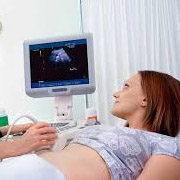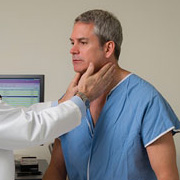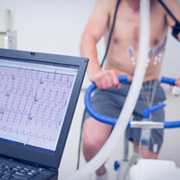 ECG is a recording of the heartbeat and rhythm. It tells how well the electrical system of the heart is working. The patient is hooked up to a recording machine by a series of 12 cables that are attached to the chest wall using sticky electrodes. A Cardiac technician performs the test that takes about five minutes.
ECG is a recording of the heartbeat and rhythm. It tells how well the electrical system of the heart is working. The patient is hooked up to a recording machine by a series of 12 cables that are attached to the chest wall using sticky electrodes. A Cardiac technician performs the test that takes about five minutes.
 Echocardiogram (Echo) is an ultrasound of the heart, like the scan a pregnant woman would undergo to look at a baby in womb. The Echo can assess the heart function, size, and shape and how the valves are working. It can identify holes in the heart and other conditions that a patient might have since they were born.
Echocardiogram (Echo) is an ultrasound of the heart, like the scan a pregnant woman would undergo to look at a baby in womb. The Echo can assess the heart function, size, and shape and how the valves are working. It can identify holes in the heart and other conditions that a patient might have since they were born.
Cardiac MRI is an MRI scan of the heart that allows us to see much same detail as an echocardiogram but also to measure what perfusion (blood flow) is like in different areas of the heart. If a patient has a narrowing of an artery the blood flow may be normal or abnormal and that helps to decide if a stent may be needed. Same is true if a patient has lots of blockages. MRI is available at Blackrock Clinic and Hermitage and will be available at Beacon Hospital later this year. Cardiac MRI is similar to MRI scan of other body organs and lasts about an hour. It is one of the most accurate tests to measure perfusion of the heart and helps to answer critical questions that decide the best way to treat certain patients. In athletes it is invaluable in identifying rare illnesses that may be associated with sudden cardiac death.
CT Coronary Angiography and Calcium score CTCA is CT scan of heart arteries. It is non-invasive and is associated with minimal risk of injury to a patient. It takes 1 minute to do scan and is most useful to rule our coronary artery disease in patients with atypical symptoms, bad family history of heart disease, risk factors or heart health concerns. Knowing what your arteries look like can help to manage risk of heart disease and prevent heart attacks in future. This test is performed in X-Ray department and costs Euro 450. It is partly reimbursed by some insurance companies. The patient lies on an X-ray table and is connected to ECG lead and machine that injects dye into arm to see arteries of heart. Test is performed by Radiographer and reported by Cardiologist and Radiologist. Calcium score is performed on all CTCA and measures level and location of plaque in the heart arteries. This information also helps to predict risk of heart attacks for patients and how to prevent them.Both tests are performed daily at Beacon Hospital and patients have to schedule an appointment through Cardiologist or GP and take a small dose of oral beta-blocker in advance of scan. This slows the heart rate down, which dramatically improves the quality of the pictures taken.
Heart monitors (Holters) are devices worn by patient to record the heartbeat and rhythm. They can be worn for 24-48 hours and continuously record or they can be worn for 1 week and only record an event (Event Monitor). The monitors usually consist of 3 ECG leads connected to a battery device that is carried on waist belt. Dr. Kelly uses ALIVECOR monitor in his clinic that is on his mobile phone. This is a licensed medical device that allows certain patients to monitor heart rate when they want or need to. These devices can be purchased through RK Cardiology. Cardiac monitors can also be surgically implanted (Loop Recorder) in patients who have undergone multiple monitors without detecting the problem. These monitors last up to 18 months. They are implanted under local anesthetic. They are about size of a small AAA battery.
Coronary angiography is a test to look at the coronary arteries around the heart and to see if there are any blocked arteries that might need stenting or bypass surgery. Test is done in hospital as a day case. In some cases the stent procedure is performed at same time. The patient lies on examination table and is draped. Sedation is given to relax the patient who is awake for the test. The consultant cardiologist will perform this test, accompanied by a team of nurses, x-ray staff and cardiac technicians. The test takes about 10-15 minutes to perform. Patients usually arrive an hour or two before the test to be admitted, medications and clinical details checked and to have procedure explained to them. Some patients may be allergic to x-ray dye and will require anti-allergy medication to take care of that.

 Watch Video
Watch Video
 Prescription Refill
Prescription Refill